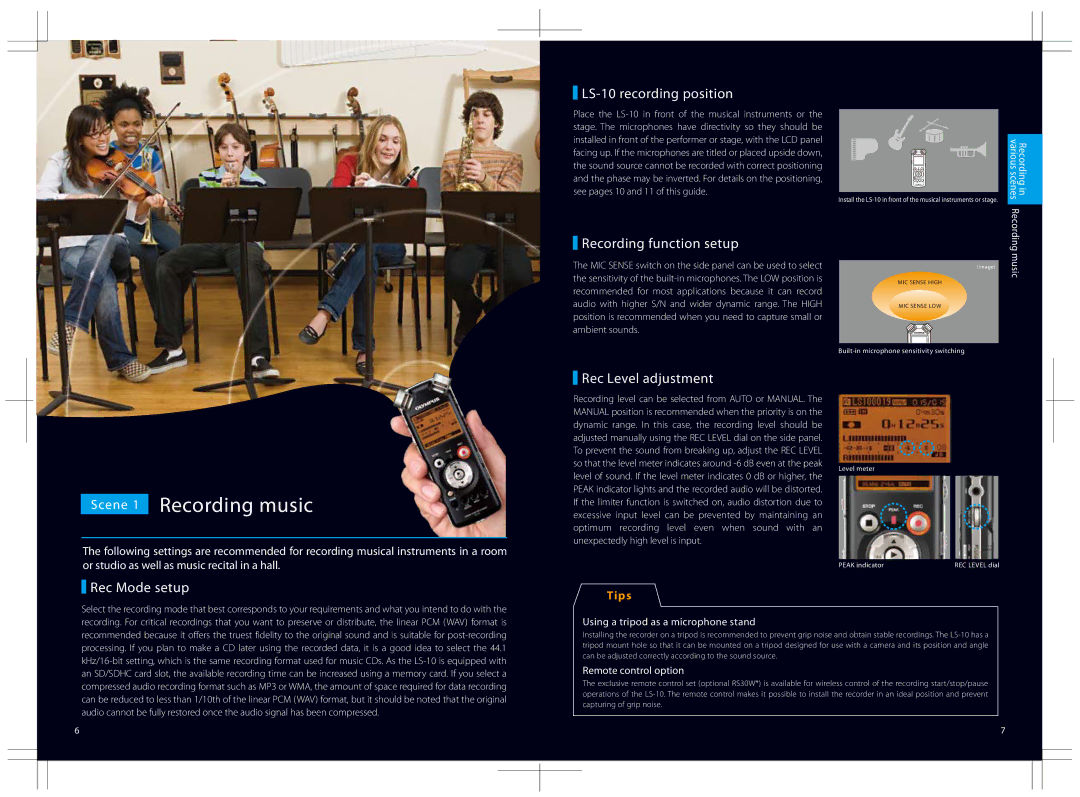LS-10 recording position
Place the LS-10 in front of the musical instruments or the stage. The microphones have directivity so they should be installed in front of the performer or stage, with the LCD panel facing up. If the microphones are titled or placed upside down, the sound source cannot be recorded with correct positioning and the phase may be inverted. For details on the positioning, see pages 10 and 11 of this guide.
Install the LS-10 in front of the musical instruments or stage.
Recording in various scenes Recording
The following settings are recommended for recording musical instruments in a room or studio as well as music recital in a hall.
Recording function setup
The MIC SENSE switch on the side panel can be used to select the sensitivity of the built-in microphones. The LOW position is recommended for most applications because it can record audio with higher S/N and wider dynamic range. The HIGH position is recommended when you need to capture small or ambient sounds.
Rec Level adjustment
Recording level can be selected from AUTO or MANUAL. The MANUAL position is recommended when the priority is on the dynamic range. In this case, the recording level should be adjusted manually using the REC LEVEL dial on the side panel. To prevent the sound from breaking up, adjust the REC LEVEL so that the level meter indicates around -6 dB even at the peak level of sound. If the level meter indicates 0 dB or higher, the PEAK indicator lights and the recorded audio will be distorted. If the limiter function is switched on, audio distortion due to excessive input level can be prevented by maintaining an optimum recording level even when sound with an unexpectedly high level is input.
(Image)
MIC SENSE HIGH
MIC SENSE LOW
Built-in microphone sensitivity switching
Level meter
PEAK indicator | REC LEVEL dial |
music
Rec Mode setup
Select the recording mode that best corresponds to your requirements and what you intend to do with the recording. For critical recordings that you want to preserve or distribute, the linear PCM (WAV) format is recommended because it offers the truest fidelity to the original sound and is suitable for post-recording processing. If you plan to make a CD later using the recorded data, it is a good idea to select the 44.1 kHz/16-bit setting, which is the same recording format used for music CDs. As the LS-10 is equipped with an SD/SDHC card slot, the available recording time can be increased using a memory card. If you select a compressed audio recording format such as MP3 or WMA, the amount of space required for data recording can be reduced to less than 1/10th of the linear PCM (WAV) format, but it should be noted that the original audio cannot be fully restored once the audio signal has been compressed.
Tips
Using a tripod as a microphone stand
Installing the recorder on a tripod is recommended to prevent grip noise and obtain stable recordings. The LS-10 has a tripod mount hole so that it can be mounted on a tripod designed for use with a camera and its position and angle can be adjusted correctly according to the sound source.
Remote control option
The exclusive remote control set (optional RS30W*) is available for wireless control of the recording start/stop/pause operations of the LS-10. The remote control makes it possible to install the recorder in an ideal position and prevent capturing of grip noise.

